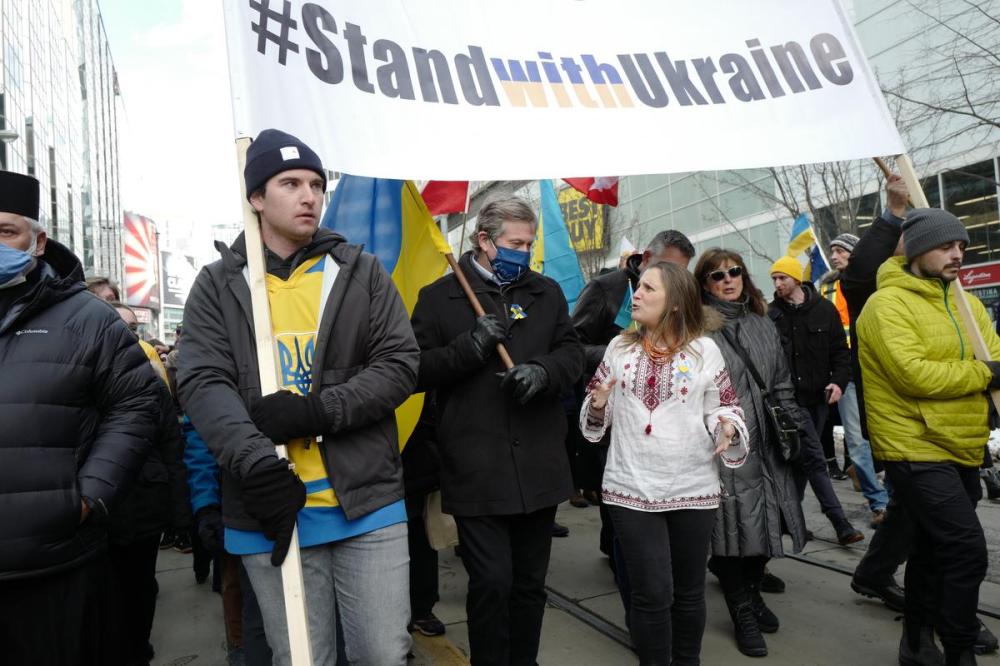Chrystia Freeland’s long crusade for Ukraine began at home in Alberta
Advertisement
Read this article for free:
or
Already have an account? Log in here »
To continue reading, please subscribe:
Monthly Digital Subscription
$0 for the first 4 weeks*
- Enjoy unlimited reading on winnipegfreepress.com
- Read the E-Edition, our digital replica newspaper
- Access News Break, our award-winning app
- Play interactive puzzles
*No charge for 4 weeks then price increases to the regular rate of $19.00 plus GST every four weeks. Offer available to new and qualified returning subscribers only. Cancel any time.
Monthly Digital Subscription
$4.75/week*
- Enjoy unlimited reading on winnipegfreepress.com
- Read the E-Edition, our digital replica newspaper
- Access News Break, our award-winning app
- Play interactive puzzles
*Billed as $19 plus GST every four weeks. Cancel any time.
To continue reading, please subscribe:
Add Free Press access to your Brandon Sun subscription for only an additional
$1 for the first 4 weeks*
*Your next subscription payment will increase by $1.00 and you will be charged $16.99 plus GST for four weeks. After four weeks, your payment will increase to $23.99 plus GST every four weeks.
Read unlimited articles for free today:
or
Already have an account? Log in here »
Hey there, time traveller!
This article was published 07/03/2022 (1374 days ago), so information in it may no longer be current.
If there was ever a Canadian politician who was in the right place at a crucial moment in history it has to be Chrystia Freeland.
It’s as if her whole life to this point was preparation for this moment: she’s a powerful deputy prime minister of Ukrainian heritage as Ukrainians fight for their lives against the invading Russian military.
Raised in Alberta, first in the Peace River region in northern Alberta and then in Edmonton, Freeland has deep roots in Alberta and the province’s large Ukrainian community. Her paternal great-grandparents settled and farmed the soil rich valleys of the Peace River. Her maternal grandparents, Mykhailo and Alexandra Chomiak left western Ukraine in 1939 and by 1945 were in a refugee camp in Germany.

In 1948 they immigrated to Canada and settled in Edmonton. But as Freeland wrote in a 2015 essay My Ukraine and Putin’s Big Lie, “for the rest of my grandparents’ lives, they saw themselves as political exiles with a responsibility to keep alive the idea of an independent Ukraine.”
On her mother’s insistence Freeland grew up speaking Ukrainian at home. And it is into the footsteps of her mother Halyna, a lawyer and community activist, that Freeland seems to be stepping.
After her parents divorced in 1978 and Halyna and her two daughters moved to Edmonton she became actively involved in all sorts of causes and later (unsuccessfully) ran as a federal NDP candidate.
In an extensive 2021 article on Freeland’s family history by Myrna Kostash, a friend describes the intense Freeland household: “Halyna had a tremendous influence on her daughters’ political and social consciousness. Their dining room table was the centre of many feminist and political discussions, events and campaigns. It was undoubtedly the scene of the campaign that Halyna spearheaded in getting women’s groups involved in an ultimately successful lobby to change the incredibly unfair matrimonial property laws in the 1970s.”
By 1989 the Soviet Union was undergoing a political earthquake and 20-year-old Chrystia Freeland was a scholarship student at Harvard. While on a student exchange to Kyiv, to study Russian history and literature, Freeland found herself in serious trouble with Soviet authorities.
According to a story in the Edmonton Journal at the time, the aspiring journalist left Kyiv to interview a Ukrainian dissident. When she left his home a local militia officer was waiting for her. She rushed away to catch a bus but the police were waiting for her at the next stop. Freeland avoided them by jumping off the bus and hitchhiking back to Kyiv.
Her scariest encounter, Freeland said, was during her last night in Kyiv. Four men, two of them KGB officers, showed up at her dorm demanding information and threatening to seize her passport. But she stood her ground even though she was “incredibly nervous” and left Kyiv soon after.
Soviet officials later complained to the Canadian Embassy in Moscow that Freeland was “a well-known trouble maker.”
By 1992, after Ukraine declared independence from the Soviet Union, Freeland’s mother had moved back to Ukraine where Halyna became actively involved in putting the country back together. By 1994, Freeland was Moscow bureau chief for the Financial Times. The long legacy of the Freeland family’s absorption with Russia and Ukraine had taken another turn.
Who could have forecast that when the “well-known trouble maker” was elected as an opposition MP in 2013 she would eventually personify Canada’s determined but humane stance in a brutal, earth-shattering war.
Her grandparents came to Canada as refugees and now their granddaughter is a key figure in the fight to save their homeland. That says a lot about Freeland but it also says a lot about the kind of country Canada aspires to be.
Whether it’s fate, or coincidence, we are fortunate to have someone so resolute and so knowledgeable in the right place at the right time.
Gillian Steward is a Calgary-based writer and freelance contributing columnist for the Star. Follow her on Twitter: @GillianSteward


